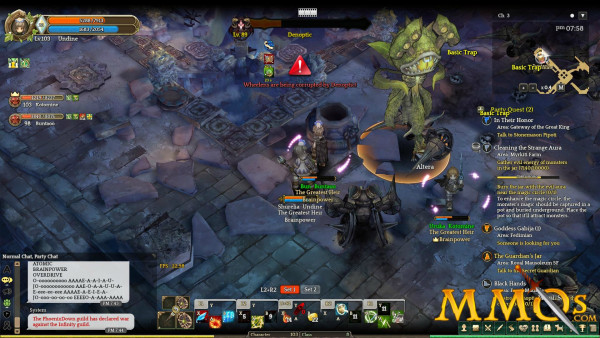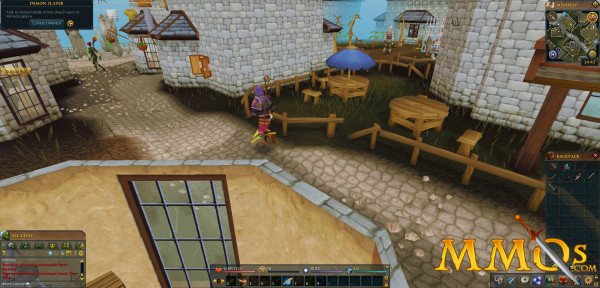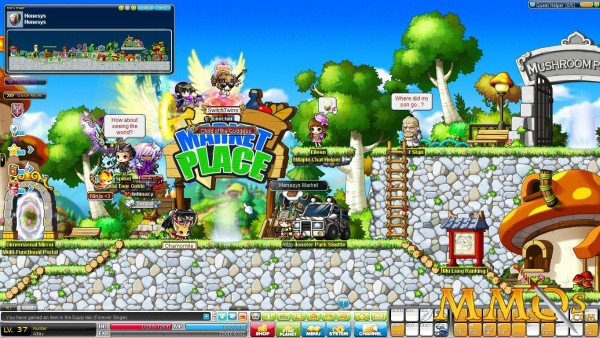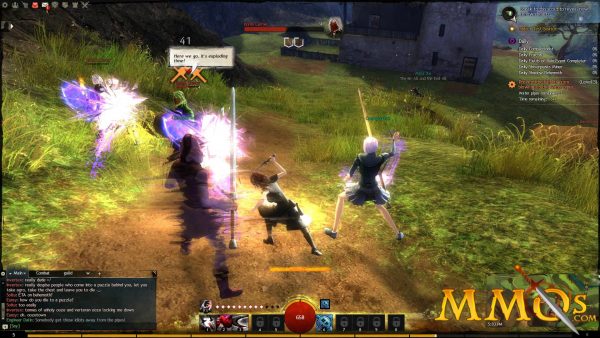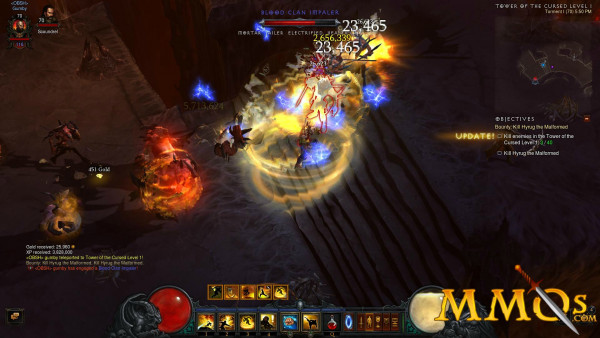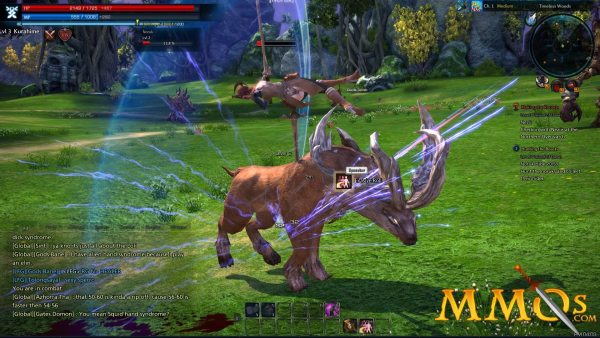MMO Botting - A Blight Or Blessing?

What’s the first thing you do when you log into your regular day-to-day MMO? You might pick up your daily quests, greet your guild mates, or manage your crafting professions.
I start the day by blocking spammers.
When you stock up on healing items to prepare for a day of dungeons and raiding, where do you obtain them? Perhaps you craft them, farm mob drops, or even buy from a vendor.
I buy mine cheap from botters.
When given the choice, how do you decide which faction to join? You might join your friends, pick the one with the fancy outfits, or choose the side that has an interesting background story.
I join the faction with the most bots.
If you asked someone these questions and they respond in a similar way to me chances are they’re playing Blade and Soul, one of the recent MMOs that gold farmers have targeted.
For many players, gold sellers are seen as a problem. They spam chat channels, send whispers and friend requests, and no matter how many you report and block another will replace them.
But as annoying as they sometimes can be they also repeat mundane, grindy tasks, then sell items I need for cheap so I don’t need to farm them myself.
Like machines in real life bots are ‘dumb.’ They have to be told what to do and if they encounter something out of the ordinary they break. This makes automating complicated tasks quite a challenge but if you give them repetitive, static jobs, they’ll be fine.
Bots are great at things like gathering and farming. They are efficient and don’t get bored like humans, so they run for hours and hours, flooding markets with cheap items and drastically lowering their value.
It sounds horrible but there is a silver lining to this.
You can’t make much money from those items if you farmed them yourself, but the lower price means they are much more affordable, and in some cases, more accessible.
Let me use Blade and Soul as an example.
Soulstones are a hot commodity that everyone needs to upgrade their gear. They’re the most traded item in game with thousands being bought and sold every 10 minutes on the European servers. The problem is that they are only available from PvP related activities so PvE players have to get their hands dirty and participate in arena and faction vs faction daily quests to upgrade their gear. This, of course, puts off quite a few PvE-only players.
Enter the bot.
Arena bots were able to inject a huge amount of Soulstones into the market. This meant that players with no interest in PvP had easy access to these items and were able to continue advancing their characters without feeling forced into PvP. Sounds great! At least for the PvE crowd.
Unfortunately, the negative effects of arena botting quickly became apparent for PvPers. For some time it was uncommon to be matched against a real opponent in an evening of arena, making it possible to climb to high ratings almost entirely by beating predictable bots. By the time you reached a high enough rating to regularly fight other human players your PvP experience would be so limited that you would have almost no idea how to fight other classes. This completely ruined the PvP experience for players, prompting many of them to quit.
Botters will rarely find profit in clearing hard content. Their tools don’t allow for it. It will always be static and repetitive tasks that give them the most gold. If a botter can provide items cheaper than a vendor, more efficiently than crafting, and in larger quantities, then players will almost certainly buy them from the marketplace and skip a tedious grind.
This relationship between bots and players has always existed. If an item you needed dropped in price overnight would you not be happy? Unless you’re a very skeptical person you would probably buy it to progress your character and disregard the possibility that it could have come from a botter. Then again, think about how unhappy you would be to find a daily quest area infested with an army of botters, tagging every mob and shamelessly teleporting around to each spawn point. It’s a love-hate relationship.
When you browse the marketplace of an MMO little thought goes into where those items come from. That is of course until you see a suspiciously large stack of items listed for a dirt cheap price. I’m sure many of us have experienced the same thing, wondering how and sometimes why.
“Maybe someone just farmed for a very long time.”
“Perhaps it’s a group of players pooling together their resources.”
“Maybe someone bought a bunch for a low price, and is now selling a large stack of them.”
“... or maybe it’s just a bot.”
It can be very difficult to determine where an item came from especially now that many MMOs omit names from the marketplace. Games like Black Desert Online, Blade and Soul and Guild Wars 2 all share this anonymous market design. Even if we were able to tell apart bot sellers and player sellers would you want to spend more money for the same item? What about that small stack of items you see, a perfectly normal number that a regular player could have gathered up. You can’t tell if that’s just a botter that split the stack to sell fewer amounts, or if they came from a bot that was left running whilst the player was at work or school. In the end they both used a bot but how would you be able to tell?
In the real world there are products that people refuse to buy due to ethical reasons. In the MMO world we rarely concern ourselves with the issue of supporting botters by buying their items and giving them gold, no matter how small or large their botting operation is.
In many MMOs, players can become reliant on bots to supply them with much needed items. ArcheAge and Guild Wars 2 have both had bots supplying the economy, making certain items accessible to all players at an affordable price. When the bots are eventually removed, prices spike up and players feel the impact bots had on the market.
In Blade and Soul, a much needed crafting material called Moonwater Tear was heavily farmed by bots in the past and sold for a low price of 11 silver. After a ban wave removed many of these bots, the value rose above 1 gold. With such a large price increase, it’s not uncommon to hear players longing for the return of these bots.
Botting is still cheating, there’s no getting around that fact. No matter how boring a task is or how tedious a grind is it’s against the rules of pretty much every MMO out there to use a bot. Using a bot to gain an advantage over other players is often met with negative response. However, if a player bought items from a botter for a low price, would that be considered cheating and taking advantage of the bots? As someone who has admittedly botted for short periods of time in the past, I can completely understand the mentality around it and why people find it tempting.
Almost every MMO today has its fair share of bots. Whilst some are more badly affected than others none of these games can alleviate their botting issues with a simple fix. On the official forums and subreddit of any MMO you’ll find plenty of bot reports from players and suggestions on how to get rid of the them. However, not many people talk about the core problem that allows these bots to survive in the first place: the game’s design.
A large amount of MMOs on the market today follow a very similar and arguably stale path of progression. You level, you gear up your character, you raid or run dungeons, and then you upgrade your gear to beat future content. When there’s an expansion or major patch this cycle repeats itself. There are a few differences sprinkled here and there that separate one game from another, but when you zoom out and look at it from a distance, almost all of them follow this exact design.
Most MMOs fail to deliver a steady enjoyable experience to their players. Exciting activities are usually followed by boring and stale ones. For example, farming consumables for a raid is boring but the raid itself is great fun. Likewise, grinding gear to compete in PvP is slow and tedious but the PvP itself is thrilling and exciting. New content is always appreciated and feels fresh, but long periods of time without anything new will quickly get boring.
In RuneScape player progression is tightly linked with repetitive tasks. Resource locations are static and on a respawn timer, making it very easy for a bot to repeatedly farm. Because such a task is so simple and easy to automate with readily available tools it’s inevitable that a player will end up creating a bot and gain an advantage over others. The bot does the boring stuff and the player can do the fun stuff.
With Blade and Soul low level dungeons drop crafting materials and healing items that players of all levels use. The game also uses weapons and accessories as fodder material to upgrade equipment, meaning that low level pieces of gear are very useful whilst leveling. A single player grinding a low level dungeon for these drops cannot make much money, but if you assign dozens of bots to do the same thing and leave them on for hours on end the money adds up.
Although it isn’t referred to as an MMORPG like the other two examples Diablo 3 is another game that botters thrived in. The Diablo franchise is an easy one to automate. Bots have existed since earlier Diablo titles due to the gameplay being relatively simple and very grind oriented. Diablo 3, however, added an additional element that made it even more attractive to botters: a real money auction house. In 2015 an AMA with a professional botter by the name of Scrybatog revealed it was possible to make nearly 7 figure sums in 3 months, with each individual bot earning hundreds of dollars per day.
In March 2014 the Diablo 3 auction house was shut down as the developers felt it undermined the core gameplay of the Diablo franchise. Although gold sellers find it less profitable than before, bots do continue to exist in Diablo 3.
What about games that have managed to curb the bot problem?
TERA is a game that has many anti-botting mechanics. I’m not talking about a form of anti-cheat protection or a well trained and watchful team of GMs. In fact, where TERA shines at beating bots is down to the game’s design itself. TERA is an action-oriented game. The combat requires you to react to the enemy and aim every skill, making it much more difficult to automate.
In TERA there are almost no low level, easy to farm areas or dungeons that will make botters a decent amount of gold. Even now the developers continue to lower item and gold drop rates to reduce bot activity. The items required for a player to progress at the end-game are almost exclusively from dungeons and daily quests. Gathering is also limited by Production Points which are restored over time or by using potions bought in the cash shop or rewarded through events and loot boxes, making it an unlikely source of income for botters despite the static spawn locations.
In addition the player economy in TERA has virtually no need for gold sellers. Almost everything in the cash shop can be directly traded on the marketplace for in-game gold. This includes character slots, name and appearance changes, and even premium membership. Gold is also plentiful from quests, meaning that players can generate plenty of income from simply playing the game instead of worrying about competing in the marketplace.
Although bots do exist and there is the occasional gold seller advertisement, Black Desert Online’s buy-to-play model serves as a wall to prevent gold sellers and botters from massing accounts. Trading between characters is also disabled so the only way for a seller to deliver your gold is to actually log into your account to farm it for you, raising many security concerns for the buyer.
Unfortunately, many anti-cheating measures can cause issues that, depending on the game, can be seen as more of a nuisance than the gold sellers themselves.
Whilst Black Desert Online’s no-trading design definitely limits real money transactions, it also restricts player freedom. The inability to trade with friends and guild mates can limit your options in helping others and working together. This restriction also appears in the recently released Tree of Savior.
Since it launched 2001, RuneScape has continued to evolve in both gameplay and anti-cheating technology. Botwatch, RuneScape’s anti-cheating software, is designed to automatically detect and ban cheaters. However, creating an automated system to look for botters can lead to unfortunate consequences.
In 2012 a defect in Botwatch lead to thousands of accounts being wrongly accused of cheating and were issued permanent bans. Although Jagex issued apologies and lifted these bans, the damage had been done and these false accusations continued into 2013.
Where there are players the bots will follow. If there is a demand for something gold sellers will be more than happy to support your needs. So next time you’re browsing the marketplace of your favourite MMO will you consider the consequences of buying that cheap stack of items you see? Or will you accept the possibility that botters are making your game more fun by filling in tedious grinds?
Either way, botters and gold sellers are here to stay, and they show no sign of slowing down.
Are they a blight on your game or a blessing?

